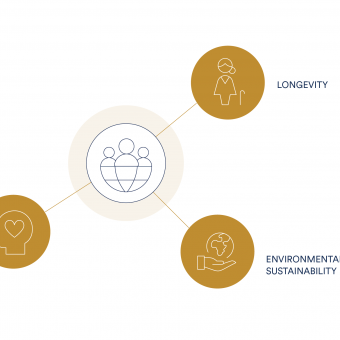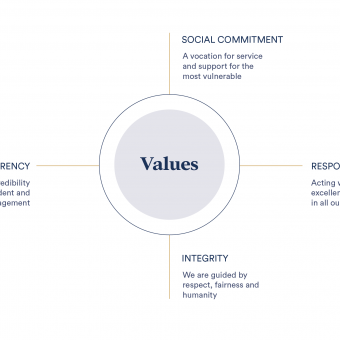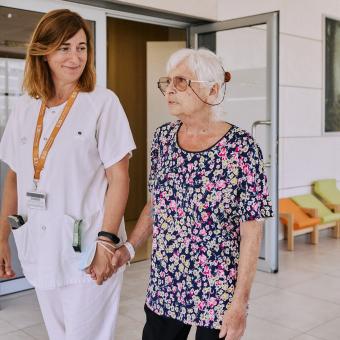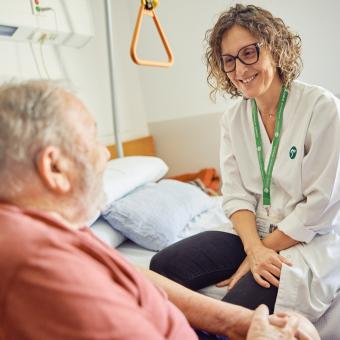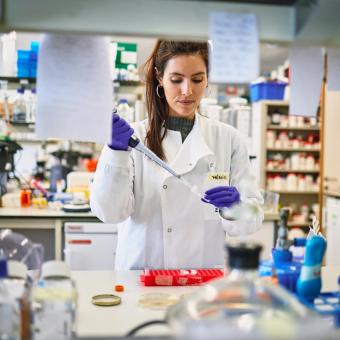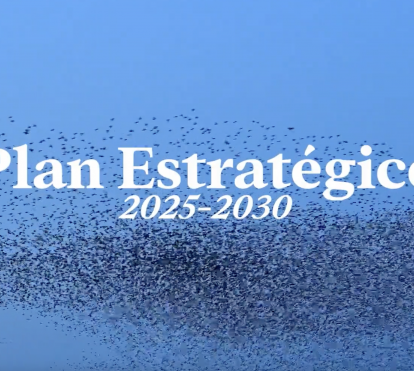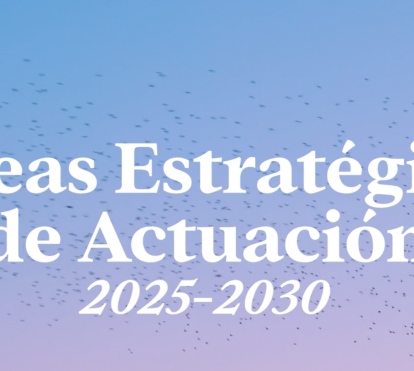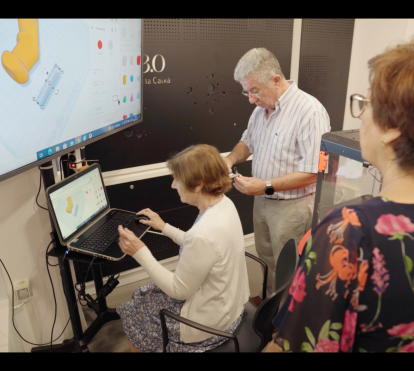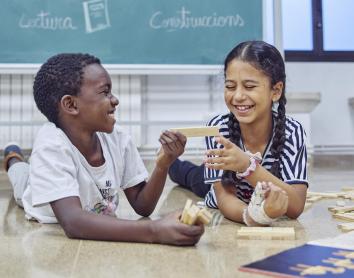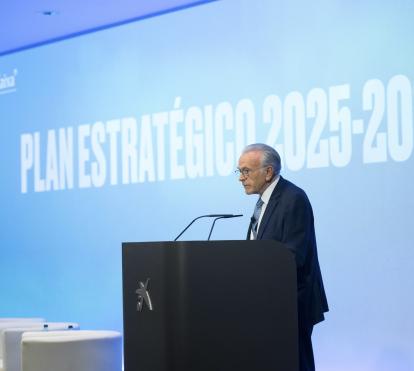
The ”la Caixa” Foundation plans to invest over €4 billion to drive social transformation
18.06.25
7 minutes readThe 2025–2030 Strategic Plan of the ”la Caixa” Foundation broadens its scope of action to respond to emerging social challenges, and sets out an annual budget of €800 million by 2030. The organisation will focus its efforts on three main strategic pillars: social action, research and fellowships, and culture. The social area will account for around 60%of the annual budget.
The ”la Caixa” Foundation today presented its new Strategic Plan for the 2025–2030 period, aimed at driving social transformation and addressing the challenges of the coming years. Under the slogan “Believing in transformation”, the new plan sets out the mission of contributing to the construction of a fairer, better society that offers greater opportunities to those who need them most.
To this end, during this period, the ”la Caixa” Foundation will focus its efforts on three main strategic pillars: social action, research and fellowships, and culture. It also plans to study new lines of action, such as environmental sustainability, mental health and longevity.
The new plan includes a gradual increase in the organisation’s annual budget to reach €800 million by 2030. In total, the Foundation plans to invest more than €4 billion between 2025 and 2030, with the bud5get distributed as follows: social action (55% to 65%), research and fellowships (15% to 25%), and culture (15% to 20%).
In 2025, the ”la Caixa” Foundation has a budget of €655 million, the largest in its history.
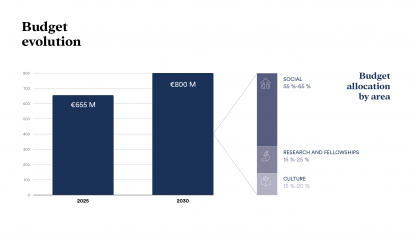
The Foundation’s Strategic Plan also envisages completing the construction of new key facilities that will strengthen its activities in the coming decades, notably the CaixaResearch Institute in Barcelona and CaixaForum Málaga.
The chairman of the ”la Caixa” Foundation, Isidro Fainé, emphasised that “the Foundation has always been an independent entity and has consistently positioned itself as such, remaining true to its principles and to its vocation to serve society and those in situations of greatest vulnerability. The new 2025-2030 Strategic Plan draws on that same essence and adapts it to the challenges and needs of our time.”
Fainé also noted that “the plan sets out the framework for action to ensure that the Foundation and CriteriaCaixa operate in a coherent and coordinated manner to achieve their common goal: delivering and developing their social mission through the proper management of their assets.
The new 2025-2030 Strategic Plan focuses the organisation’s activities around three main strategic pillars:
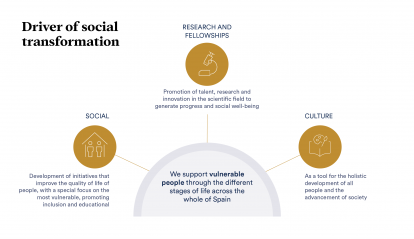
Social
The Foundation’s new Strategic Plan aims to develop social and educational initiatives focused on reducing vulnerability and enabling a dignified life for those most in need.
These include reducing poverty, exclusion and inequality; tackling unemployment and job insecurity among the most vulnerable; expanding the comprehensive care model for people with advanced illnesses; supporting and guiding older adults, especially those most at risk; and promoting equal opportunities by strengthening the education system through the training of teachers and leadership teams.
Currently, the priority lines of action of the Foundation, which support individuals in situations of social vulnerability in different stages of life across the whole of Spain, are as follows:
- Tackling poverty, with a particular focus on child poverty through
the CaixaProinfancia programme. Since its launch, this project has
supported nearly 400,000 children and adolescents from families at risk of
social exclusion. In recent years, the programme has expanded its reach and is
now present in all Spanish provinces, as well as in Portugal. The ”la Caixa” Foundation also operates two local
direct-support centres: the Fundación de la Esperanza, in Barcelona, and the EspaiCaixa Francesc d’Assís, in Manresa. Improving education is the cornerstone
of all initiatives to combat poverty, whether through the CaixaProinfancia
programme or other projects focused on training, such as ProFuturo or EduCaixa.
- The social and labour market inclusion of people at risk
of social exclusion through the
Incorpora programme, which now operates in all Spanish provinces and in
Portugal. Incorpora has built a network of nearly 100,000 collaborating
companies and has facilitated close to 450,000 employment contracts. The programme has also launched a self-employment initiative to support the creation and consolidation
of new businesses. In addition, the Reincorpora
initiative helps people who have been deprived of their liberty to rebuild
their lives through social and labour reintegration.
- Humanising healthcare through the Comprehensive Care for
People with Advanced Illnesses programme, which provides psychosocial and spiritual support to
individuals at the end of life and to their families. The programme currently
operates with 76 teams comprising over 320 professionals, working across 173 hospitals in all of Spain’s autonomous communities as well as in
Portugal.
- Supporting older people
through the programme for the Elderly,
the longest-running initiative of the ”la Caixa” Foundation, which today
promotes active and healthy ageing while helping to reduce the risk of
isolation and loneliness within this group.
Additionally, in the social area, several other key initiatives are also being developed:
- The Foundation’s role as an intermediary body for the European Social
Fund Plus, enabling it to implement the Más
Infancia, Más Empleo and Más Empleo Joven programmes.
- International Cooperation, through calls for proposals supporting projects led
by non-governmental organisations working for the most vulnerable populations
in countries across Africa, Asia and Latin America. Specifically, the Child Survival
call, aimed at improving the health of children under five in sub-Saharan
Africa; the partnership for childhood vaccination through GAVI, The Vaccine
Alliance, in collaboration with CaixaBank and the Gates Foundation; and the
Work4Progress programme, which promotes job creation for women and young people
in India, Mozambique, Peru and Colombia.
- The Calls for Social Projects, which fund more than 1,600 projects run by non-profit
organisations across each autonomous community, as well as a national call for
social action projects in rural areas with fewer than 10,000 inhabitants; a
national call for Social Innovation; and the calls in Portugal for Promove
(focused on inland areas bordering Spain) and the BPI Fundação ”la Caixa”
Awards (in their four categories: “Capacitar”, “Solidário”, “Seniores” and “Infância”),
with a total budget of €60.5 million for 2025.
- The Social Observatory, which offers funding for social research (Social Research
Call, Flash, and Conecta), disseminates knowledge through its publications, the
Social Observatory Café and various conferences and activities, and fosters
spaces for dialogue to connect experts from the academic and social sectors.
- And Palau Macaya, designated by UNESCO as an International Centre for the
Humanities and Social Sciences, which promotes the exchange of ideas and
presents forward-looking proposals with a transformative impact on society.
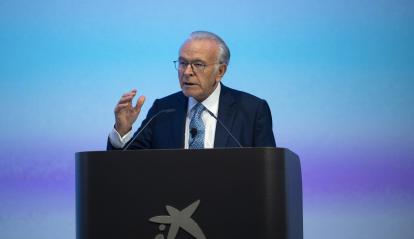
Research and fellowships
The promotion of a scientific ecosystem that drives applied research and talent development to address health and wellbeing challenges is the main objective set out in the Strategic Plan for the area of Research and Fellowships.
The specific objectives in this area are the creation of Europe’s first philanthropic ecosystem of biomedical and biotechnological research centres, led by the CaixaResearch Institute, and to attract, develop and retain the best national and international scientific talent.
The Foundation also seeks to promote research in the social sciences that addresses society’s main challenges and proposes ways to improve and implement solutions; to generate new knowledge and ensure its transfer, both to new treatments that improve life expectancy and quality of life and to technological solutions that foster sustainable and responsible development, and, finally, to generate knowledge to strengthen the education sector through practice-oriented educational research programmes and the promotion of evidence-based approaches.
The CaixaResearch Institute will be Spain’s first major cross-cutting and interdisciplinary research centre specialising in the immunology of diseases, and aims to become a global benchmark. Although the first phase of the new building is scheduled to open at the end of 2025, two research groups are already active, and the Biomedical Data Hub has been established.
At present, efforts are also focused on strengthening collaboration among the research centres linked to the Foundation in order to foster synergies among scientific communities.
The centres are: IrsiCaixa (Research Institute on Immunopathologies ”la Caixa” Foundation), ISGlobal (Barcelona Institute for Global Health), VHIO (Vall d’Hebron Institute of Oncology), BBRC (Barcelonaβeta Brain Research Centre), IRSJD (Sant Joan de Déu Research Institute), and GIMM (Gulbenkian Institute for Molecular Medicine, in Portugal).
Also notable in this area is the Fellowships programme, established in 1982 to promote excellence in education and now covering all stages of higher education.
In addition, through the Health Research Calls, the most significant philanthropic initiative of its kind in Spain and Portugal, the Foundation supports outstanding scientific research aimed at advancing transformative projects in biomedicine and health with a tangible impact on society. Since 2017, 200 projects have been supported.
The Health Innovation Calls, meanwhile, promote the translation of cutting-edge research from the laboratory to patients through the creation of new products, services and companies in the life sciences and health sectors. To date, 232 projects have been supported, 128 patents have been registered and 50 companies have been created.
Culture
The 2025–2030 Strategic Plan establishes the promotion of culture as a driver of social transformation, ensuring it reaches all audiences, as the main goal in this area for the coming years.
To achieve this, the plan sets out the following objectives: to promote a high-quality cultural offering in collaboration with leading national and international institutions; to create activities and content to the highest standards of quality; to define priority audiences based on territorial and social diversity; to involve the community and key audiences in the content creation process, along with collaboration from experts; and to ensure access for all to cultural and educational initiatives by enhancing digital content.
With these principles in mind, the CaixaForum network is present in 9 cities across Spain. In 2024, these centres received more than three million visitors. CosmoCaixa, meanwhile, is one of Europe’s leading science museums. This centre promotes social progress through scientific dissemination and welcomed over one million visitors last year alone. Also part of the Foundation’s cultural facilities is Cap Roig, a unique setting that brings together nature, art and culture.
CaixaForum+ is one of the Foundation’s most recent cultural initiatives. It is a streaming platform specialising in cultural and scientific content, with around 270,000 subscribers and over 1,700 pieces of content.
Exhibitions and activities are the central pillar of the programme for promoting the arts, sciences and humanities, both in its own centres and across the wider territory.
In addition to in-house programming, the cultural offering last year included 82 travelling exhibitions and 12 concerts in 71 cities in Spain and Portugal, attracting a total audience of 4.6 million visitors. Furthermore, the Contemporary Art Collection, launched in 1985, is one of the most important private collections in Europe, featuring works by both national and international artists. It currently comprises 1,077 works by 454 artists.


